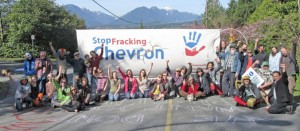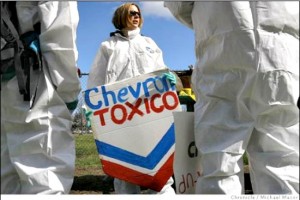Chevron’s freedom to pollute vs. Bay Area residents’ right to breath
by Daniel Borgström
On Tuesday, July 29th, I went to the Richmond City Council meeting where the council was to make a decision on a proposed expansion of the Chevron Refinery. The City Planning Commission approved the expansion, but with conditions that Chevron didn’t want to accept. So Chevron appealed it to the City Council.
It was held in the large Richmond Auditorium to accommodate an expected crowd of Bay Area residents (and paid-by-Chevron speakers), 15,000 of whom were sent to the hospital following the huge refinery explosion in 2012. Chevron mobilized several hundred employees to attend the meeting, wearing blue and white pullover shirts, and waving signs saying “A Modernized Refinery” and “Richmond Proud” — slogans from Chevron’s PR campaign. The blue & white shirts made their supporters very visible, and at first it appeared that they overwhelmingly outnumbered people of the Richmond Progressive Alliance (RPA).
The RPA was indeed outnumbered, but not as badly as it had at first appeared. Judging from the amount of applause that speakers from each side received, I could tell that there were a sizable number of people there to support the RPA or who supported their position.
For the past two decades, the RPA has been standing up to Chevron, which has always dominated Richmond. At this hearing the RPA called for the City Council to affirm the Planning Commission’s conditions to impose environmental standards and limit pollution.
There were about 80 speakers. A friend and I stayed only for the first two hours. Most of the speakers during this time expressed concern about air quality and health problems; these included Asian community members who had been hospitalized as a result of inhaling toxic fumes during the refinery fire. Some of the refinery’s critics wore signs saying: “I’m not paid to be here.” — that was in reference to reports that Chevron supporters at the previous meeting had been paid to attend. A reporter from KPFA found a woman with a clipboard checking off names of Chevron’s acolytes. The clipboard lady of the previous week was also at this meeting. Another KPFA reporter got a photo of her.
The people sitting around us included people from both sides. Interestingly, several times I noticed some of the people in blue and white applauding speakers who pointed out the environmental hazards created by the refinery. That surprised me; I didn’t know what to make of it, or what it might imply.

We left at about 8:30 p.m., before the city council made its decision. Afterwards I heard the news, that the council acceded to Chevron’s demands. Mayor Gayle McLaughlin and Vice Mayor Jovanka Beckles abstained over the failure to fund the hospital which had treated people during the 2012 Chevron fire.
Richmond has been a company town throughout its existence. First it was a Standard Oil town. When Standard Oil was broken up, it became a Chevron town. During the 1980s and 90s it spread less money around, probably because of corporate tax breaks making it less tax wise, and that made an opening for the RPA. When the RPA made gains and Chevron realized they’d lost control, Chevron began a campaign which included spreading money around as part of a “community benefits” agreement — one way that Chevron gets nonprofits on their side.
It left me wondering if Chevron might’ve also invested some of its PR budget money in KPFA, encouraging the clique who run the station to take Andrés Soto off prime time. Andrés had been a very effective show host of KPFA’s Morning Mix; and an RPA activist with Communities for a Better Environment. He often focused on news about the Richmond refinery and its environmental effects — the 2012 refinery explosion and resulting pollution which sent 15,000 people to hospitals, as well as the hazards of the dirty crude which was being brought into the town in railroad tank-cars. He was also tuned into Chevron’s affect on Richmond politics and talked about who is in Chevron’s pocket. Andrés Soto’s show is hardly something that Chevron would care to have broadcast across Richmond as they try to reclaim it as the company town it was before the rise of the RPA
Ann Garrison and Steve Gilmartin contributed to this article.
To read more from Daniel Borgstrom:
http://danielborgstrom.blogspot.com/
Andrés Soto’s program, now titled “Afternoon” can be heard from 3:30-4 pm on Thursdays at KPFA, 94.1 fm, or streaming at kpfa.org. His program was cut in half and given a more obscure time slot when the Morning Mix was taken off the air..


